Have you recently installed a new roof? A prompt roof inspection after installation is invaluable. It serves as a critical check to avoid future repairs, ensuring your roof is dependable from day one. It’s a practical approach to protect your home and wallet.
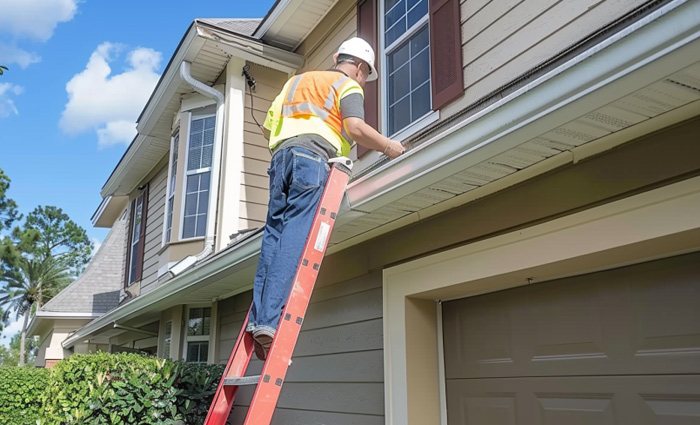
Key Takeaways
- A post-installation roof inspection is imperative for ensuring a new roof’s safety, integrity, and correct installation. This can prevent future structural problems and provide homeowners security and peace of mind.
- Professional roof inspections, whether traditional or utilizing high-tech analysis such as drones and infrared, involve detailed examinations of the roofing system both externally and internally to ensure no defects or issues compromise its integrity and function.
- If a new roof fails inspection, it’s crucial to contact the original contractor for necessary repairs under warranty, follow up with additional inspections as needed, and seek legal or consumer advocacy assistance if the contractor is uncooperative.
The Necessity of a Post-Installation Roof Check
A roof stands as the guardian of your home, shielding it from storms, heat, and cold. But what guarantees that this guardian was appointed correctly? That’s where the importance of a post-roof installation check comes to light. A thorough roof inspection by a certified professional is the seal of approval every homeowner should seek after having their roof installed. It isn’t just about ticking a box; it’s about ensuring your household’s safety and your investment’s integrity. After all, an issue as minor as missing flashing or inadequate weather resistance can have dire consequences, ranging from leaks to structural damage, which is why early detection is crucial.
Perhaps the most significant benefit of a roof inspection is reassurance. Knowing that a professional has scrutinized every shingle and seal and has affirmed that your roof is correctly installed offers an invaluable sense of security. It’s a protective measure that not only safeguards your home but also provides clarity and peace of mind. In the event of a future issue, you can rest assured that your roof was installed with precision and care.
Ensuring Proper Installation
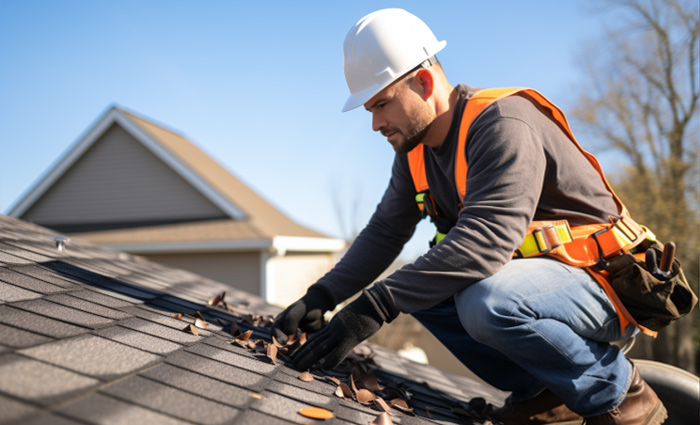
Ensuring that your new roof is installed correctly is not merely about aesthetics but performance and longevity. A certified roof inspector will examine your roofing system’s interior and exterior aspects with a fine-tooth comb. They will verify that each shingle is nailed down securely and properly aligned and that the overhang is within the optimal range to guard against water infiltration and wind damage. The inspector’s keen eye will also assess the flashing, a component crucial for channeling water away from the roof’s vulnerable areas. To fulfill its purpose, it must be intact, properly installed, and free of peeling or rust. Having your roof inspected by a certified roof inspector ensures the quality and durability of your new roof.
Moving beyond the exterior, the inspector will also venture into the attic. Here, they will look for uniformity in the roof’s appearance and scan for any signs of discoloration or rot. These could be telltale signs of moisture penetration or flaws in the roofing installation, leading to more significant problems if left unchecked. This rigorous examination process is the cornerstone of ensuring that your roof replacement process results in a durable, weather-resistant covering over your home.
Detecting Early Issues
The adage “a stitch in time saves nine” rings especially true when it comes to your roof. Detecting early issues post-installation can be the difference between simple fixes and extensive water damage repairs. A professional roof inspection can unearth the following:
- Poor workmanship
- Material defects
- Placement of shingles
- Condition of fixtures like fascia and soffits
- Even the most minor signs that suggest subpar quality
This meticulous assessment includes all of these factors to ensure that any issues are caught early and can be addressed before they cause significant problems.
Regular maintenance check-ups are pivotal, but the inspection after installation serves a more urgent purpose: to ensure the roofing materials and workmanship are up to the mark from day one. This preemptive measure can alert you to any structural issues or leaks that, if addressed promptly, can save you from the distress and expense of damage control down the line.
Comprehensive Guide to Professional Roof Inspection Services
Diving into the realm of professional roof inspection services, one finds a landscape dotted with diverse options. These inspections differ not only in price but also in the level of technological sophistication employed. Regular maintenance check-ups by your roofing company are beneficial, but they serve different objectives than a dedicated roof inspection. The latter is a more in-depth look at the health of your roofing system. Whether you’re considering a roof inspection for annual preventative maintenance or as part of the due diligence before purchasing a new home, it’s an investment in the longevity of your property.
Timing is also essential; the ideal period for a roof inspection is typically in the fall. This is not just because of the favorable weather conditions but also as preparation for the harsher winter months ahead. As a homeowner, it’s important to understand what’s included in a roof inspection. Does it cover both the exterior and interior evaluation? Will it utilize advanced technology like drones or infrared inspections? Knowing these details ensures that you get a comprehensive service that leaves no stone—or, in this case, shingle—unturned.
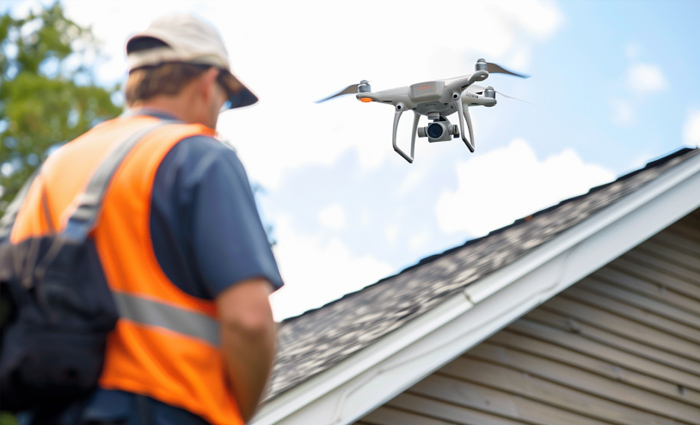
In-Depth Examination with Physical Inspection
The traditional in-depth examination with a physical inspection remains a cornerstone of professional roof inspection services, including roof inspections. This hands-on approach allows the inspector to closely scrutinize every inch of your roof’s exterior and interior. It’s a meticulous process that for roofersthevillagesfl.com involves:
- Climbing onto the roof
- Checking for any loose materials
- Inspecting the gutters for clogs that can lead to water damage
- Searching for any signs that could indicate mold or other forms of damage
It’s a physically demanding task that requires a keen eye and expertise to ensure that your roof is structurally sound and equipped to protect your home from the elements.
A physical inspection is also a chance to evaluate the roof’s underlayment, its overall condition, and any potential issues that might not be immediately visible. It’s a thorough process that offers a comprehensive look at your roof’s current state, providing a vital piece in the puzzle of home maintenance.
High-Tech Analysis: Drone and Infrared Inspections
In the pursuit of precision and safety, high-tech analysis has become an integral part of the roof inspection process. Some of these high-tech analysis methods include:
- Drone inspections, which offer a bird’s eye view of your roof, capture detailed visual information from angles that might be inaccessible or unsafe for inspectors to reach by traditional means.
- Thermal imaging can detect areas of heat loss or moisture intrusion in your roof.
- Moisture meters can measure the moisture content of your roof to identify potential leaks or water damage.
- Infrared cameras can detect areas of heat or energy loss in your roof.
These innovative inspections reduce the need for inspectors to physically traverse the entirety of the fiberglass shingle roof, which can be particularly beneficial for steep or complex roofing systems.
Infrared inspections are another leap forward in roofing technology. By detecting subtle temperature variations with thermal imaging, these inspections can uncover hidden damage, such as minor leaks and fissures, long before they become visible to the naked eye. Though they may come at a higher cost, the comprehensive view of your roof’s integrity that an infrared inspection provides can be invaluable in preventing future problems.
What Does a Roof Inspector Look For?
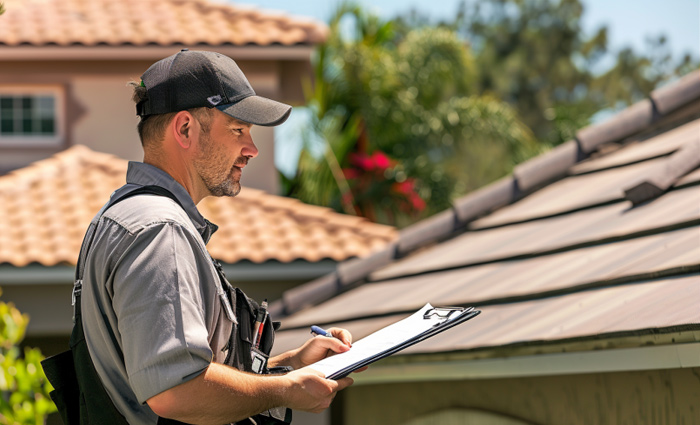
When a professional roofer arrives to inspect your roof, they come with a checklist that covers the full spectrum of potential issues. They assess the structural integrity, ensuring that the overall structure, including rafters and trusses, is sound and capable of withstanding the rigors of the environment. They examine the condition of roofing materials, such as shingles and tiles, looking for any signs of wear, damage, or improper installation that could compromise the roof’s effectiveness. The inspection process is thorough, leaving no stone unturned to ensure that your roofing system is up to code, strong enough to keep water out, and well-ventilated.
Moreover, roof inspectors are on the lookout for missing or damaged materials and mistakes that might have been made during installation. Their expert eyes are trained to spot minor discrepancies that could lead to significant issues down the road, ensuring that homeowners are not left dealing with the fallout of a poorly installed or deteriorating roof.
Interior Evaluation
The interior roof inspection is as critical as the external examination when it comes to a roof inspection. Here, the inspector turns their attention to the attic, checking for:
- Signs of movement or moisture penetration in the structural supports
- Structural issues like cracked rafters or a sagging ceiling could indicate serious problems with the roof’s ability to bear weight.
- Signs of rot, especially in the roof decking, could suggest that water has found its way in
Additionally, the inspector will be on the lookout for leaks, which might be evidenced by compromised roofing felt or membrane. They also assess the level of insulation and ventilation within the attic. These are crucial for maintaining the home’s energy efficiency and preventing issues like ice dams in colder climates. It’s a detailed process that offers final thoughts on the roof’s interior quality and structural integrity.
Exterior Scrutiny
Stepping outside, the inspector’s scrutiny shifts to the roof’s exterior components. This part of the inspection is vital and requires professional expertise to perform accurately. As the inspector methodically goes over the roof’s surface, they are vigilant for any signs of:
- rot, which can be a red flag for more extensive underlying issues
- wear and tear, such as loose or missing shingles
- any cracked or split roofing materials that could jeopardize the roof’s integrity
The evaluation also includes looking for any other issues that may affect the roof’s performance and durability.
This exterior roof inspection is not just about identifying current problems; it’s about forecasting potential issues that could arise. By catching these early, homeowners can avoid the escalating costs and headaches associated with significant roof damage.
Steps to Take if Your Roof Fails Inspection
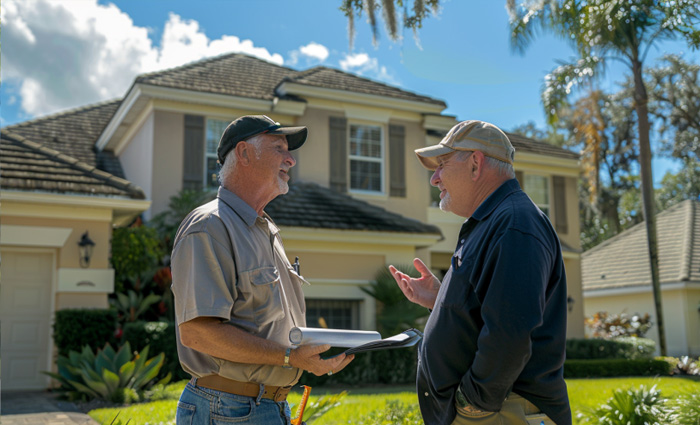
Discovering that your brand-new roof has failed inspection can be a disheartening experience. However, there are clear steps to take to rectify the situation. Here are the steps you should follow:
- Contact the original roofing contractor who installed the roof.
- Present them with the inspection results and expect them to perform the necessary repairs or replacements, often at minimal or no extra cost, especially if they are responsible for the issues identified.
- Review your contractual agreement and warranty, as these documents will guide your next steps and protect your rights as a homeowner.
After completing any necessary repairs, insist on another roof inspection to ensure that all issues have been properly addressed. Should the contractor be uncooperative or dispute the need for repairs, don’t hesitate to seek legal advice or reach out to consumer protection organizations like the Better Business Bureau. It’s your right to demand quality work and to hold contractors accountable for the integrity of your roof.
Selecting the Right Roofing Contractor for Your Inspection
Selecting the right qualified roofing contractor for your inspection is a decision that should not be taken lightly. It’s imperative to look beyond glossy brochures and slick websites; instead, focus on the contractor’s track record. A contractor’s previous work and client feedback offer invaluable insights into their work ethic and quality. Local contractors also bring the advantage of familiarity with regional building codes and weather patterns, which can impact the inspection’s outcome.
When comparing contractors, it’s crucial not just to look at the price but to scrutinize the scope of services offered. Multiple estimates can help you discern the market rate and set your expectations for what a thorough inspection should encompass. Moreover, examine the estimates closely for thoroughness and transparency. Red flags to watch for include hidden fees or vague explanations of the services provided. Ensure there is clarity around what the inspection will cover and that the contractor is upfront about any additional costs that might arise.
Your home’s well-being depends on the quality of the inspection, so choose a reputable roofer who will deliver a comprehensive evaluation.
Qualifications of a Professional Roof Inspector
The qualifications of a professional roof inspector are non-negotiable. At the minimum, they should have:
- a high school diploma
- additional education (often favored by employers)
- licensing or certification (required in most states)
- experience in the roofing industry or a related educational background (such as a degree in engineering or architecture)
These qualifications ensure that inspectors have the necessary expertise to conduct a thorough inspection.
On-the-job training is also indispensable for a roof inspector. This training helps them stay abreast of current regulations, inspection methods, and the specifics of local building codes. When selecting an inspector, ask about their qualifications, experience level, and whether they receive ongoing training to keep up with industry standards.
Comparing Roof Inspection Costs
Understanding the cost implications of a professional roof inspection is essential for homeowners. The price of an inspection can vary significantly depending on the type of inspection conducted, with physical inspections generally falling between $200 and $400. Drone inspections offer a different price range and level of detail, with costs also influenced by the complexity of the roof’s design. Given their advanced technology and comprehensive results, infrared inspections tend to be on the higher end of the cost spectrum, often starting at $400.

However, it’s important to remember that the cost of an inspection is also influenced by the roof’s size, accessibility, and the inspector’s expertise and certification. When evaluating costs, homeowners should weigh the long-term benefits of a quality inspection against the initial expense. While it may be tempting to opt for the cheapest option, investing in a thorough inspection by a certified and experienced professional can save you from future costs and ensure the longevity of your brand-new roof.
Roof Inspection Summary
As we wrap up this comprehensive guide, it’s clear that the importance of a roof inspection post-installation cannot be overstated. Ensuring that your new roof is faultlessly installed and accessible from early issues not only protects your home from potential damage but also solidifies your investment. Professional roof inspections, be they physical, drone-assisted, or infrared, are indispensable tools in a homeowner’s arsenal, offering an in-depth look at the condition of a brand-new roof and peace of mind that it has been installed with expertise and care.
In closing, remember that the quality of your roof inspection is largely dependent on the qualifications and diligence of the roofing contractor you choose. Comparing costs, qualifications, and reviews will help you find a reputable roofer who can provide a thorough and honest evaluation. Although these steps may require time and effort, they will ensure the longevity and integrity of your roof, saving you from potential headaches and financial strain in the future.
Frequently Asked Questions
How often should I get my roof inspected?
It is recommended to have your roof inspected annually for preventative maintenance, especially in the fall, before the winter months, or before purchasing a new home to ensure everything is in top condition. Therefore, scheduling an annual inspection is advisable for maintaining the condition of your roof.
What’s the difference between a roof inspection and a maintenance check-up?
A roof inspection is a comprehensive evaluation conducted by a certified professional to identify potential issues, while a maintenance check-up is a routine assessment focusing on basic upkeep. Both are important for the overall health of your roof.
Can drone and infrared inspections replace the need for a physical roof inspection?
While drone and infrared inspections offer unique advantages, they are generally used to complement rather than replace a physical roof inspection. Combining methods ensures the most thorough evaluation of your roof’s condition.
What should I do if my roof fails an inspection after installation?
Contact the original roofing contractor for repairs or replacements as per your contractual agreement and warranty. Seek legal advice if necessary to ensure the issues are adequately addressed.
What qualifications should I look for in a professional roof inspector?
Look for a roof inspector with the proper licensing or certification, additional education in related fields, prior roofing experience, and ongoing training to ensure a thorough and expert inspection. These qualifications vary by state and should be carefully considered.
(352) 293-2449
For the original version of this article visit: https://roofersthevillagesfl.com/roof-inspection-after-installation-101/
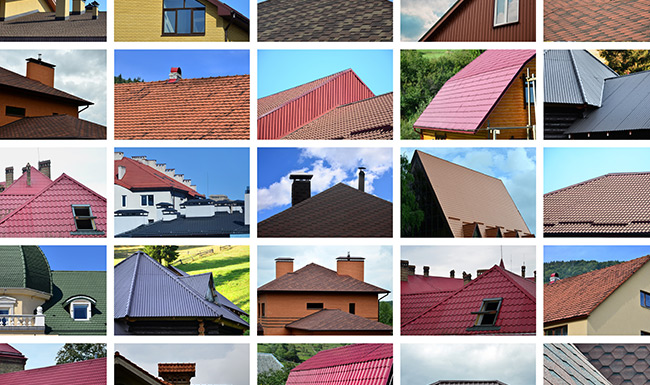
No comments:
Post a Comment
Note: Only a member of this blog may post a comment.